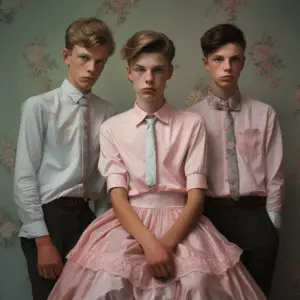
Teenage Boys Wearing Dresses: Understanding and Support
For many parents, their teenage son is the calm center in a sea of swirling emotions. They’re living through an upheaval they never saw coming. The parent who was happy and feeling secure gets swept away by the rising tide of uncertainties.
Their emotional investment in the child’s development becomes more painful to endure when the child defies all expectations and behaves in ways that defy logic. Like when your teenage boy starts to defy societal expectations of a man in terms of dressing. For instance, they may decide to rock in dresses, make-up, or other female-related garments.
This article sheds light on why your teenage boy may wear dresses and provides insights on how you can guide him in the right way. Keep reading.

Why Does Your Teenage Son Wear a Dress?
If you have a teenage son, you know how often they rebel. They want to be independent and make their own choices. For instance, in dressing, they want to do what is from their heart, to express their personality and feelings, or attract attention.
So, it should not come as a surprise if you find your teenage boy rocking in a dress or other female-associated garments. Yes, it could be against your norms, but you have to understand that they are still growing. They may face a huge challenge in defining self and understanding their personality. So, avoid being judgemental, and foremost establish the cause.
Basically, many factors come into play in luring a teenage boy into dressing like a female. Below are some of them.
It’s a Way to Express His Individuality and Personality
You might be surprised to learn that your teenage boys wear dresses to express their individuality and personality. And why not? After all, when we were growing up, most wore dresses at some point in our lives to experiment. So why not let our sons dress up like a girl for a day and enjoy the feeling?
This trend is because many teenagers are trying to find their own unique identity by expressing themselves in various ways. So many would like to wear skirts, make-up, high heels, and wigs for fun and excitement.
This can be especially true for boys raised by females or who have many sisters around them at home. They may feel like being a girl is much more special and unique; that’s why they try their best to imitate their sisters either way, in a quest to be them.
Your Child Might Have Gender Identity Issues or Gender Dysphoria
If your child has gender identity issues or gender dysphoria, he might wear dresses, skirts, and other clothing that he feels are not “masculine” enough. He might also strongly desire to look like a girl, even if he’s not transgender.
Gender identity is how you think about yourself as a person, about being male or female. Gender dysphoria is the distress someone feels because of the conflict between their biological gender (usually male or female) and the gender they feel inside.
If your child has gender identity issues, it’s important to talk about this with them — as soon as possible. Talking about it early will help him feel more comfortable in their skin and makes it easier for them to come out as transgender when the time is right.
They Might be Gender Non-conformist
A teenage boy who wears a dress might be gender non-conforming. Gender nonconformity is a term used to describe the act of being different from the stereotypical gender expectations placed on someone.
Gender non-conformity can be seen in many ways, including wearing clothing that does not adhere to the social norms of gender. For instance, when boys wear dresses, they may feel that their bodies are not conforming to the common societal idea of what men should look like. So in most cases, they will choose to ignore these stereotypes.
He Could Be Curious or Rather Experimenting
If your teenage son wears a dress, it might not be because he’s transgender. It could be because he’s curious or experimenting with his gender identity.
He is just trying things and doesn’t fully understand why he is doing them. Maybe he thinks wearing dresses will make him more feminine and attractive. Or maybe he wants to see how other people will react when they see him in female garments.
All in all, he might be trying to find out what it feels like to wear a dress or see how comfortable he can get while wearing one. However, it’s normal for teens to experiment with their appearance without thinking too much about it first.
What To Do if Your Teenage Son Continues To Wear Dresses
If you have a son who dresses as a girl, there are some things you can do to help him. First, try to understand why your son is doing this. Is he transgender? Does his medical condition make him feel like a girl or a boy? Or could it be that he’s just experimenting with his identity and is trying on different clothes with the same results?
You can try talking with him about this if it’s the latter. You might find that opening up a discussion will help him see there are other ways of being transgender besides wearing make-up and high heels.
Below are a few basic tips that you can rely on to counter your teenage boy’s curiosity.
Don’t make it a big deal
Your son will feel better if he isn’t made fun of for wearing dresses and if there are no negative consequences.
Invite him for a talk
You can’t change his behavior overnight, but you can start by talking to him about what you see and think. Tell him there is nothing wrong with being a boy and that he should be proud of who he is.
Encourage him to get dressed in more masculine clothing
Many young boys don’t have positive role models for dressing in masculine clothes; therefore, it can be very difficult for them to make this change on their own when they are older teens or adults.
Needless to say, dressing in masculine attire may make it easier for your son to take pride in himself and his appearance without having to wear dresses all the time.

Bottom Line
Parents have an incredible opportunity to either foster or block the innate curiosity of their children by allowing or disallowing them to explore and express themselves creatively.
Although your son might not thank you for it immediately, allowing him to dress in a way that makes him feel confident and empowered will deepen his self-awareness, which will help him blossom into his authentic self.
Finally, it will also send an important message about the fluidity of gender and how clothing is just a small part of our shared humanity.